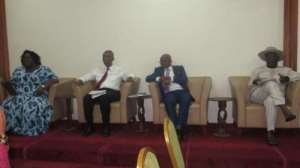
Four renowned local governance experts, at the end of a roundtable organised by the Institute of Democratic Governance (IDEG), have hailed Ghana's Decentralised Local Governance system.
According them, the system had achieved a lot over the past 30 years although there was still more room for improvement.
The Experts include; Professor Kwamena Ahwoi, a member of the Centre for Democratic Transition and an adjunct Professor of Law at the GIMPA Law School, Dr Esther Oduraa Ofei-Aboagye, the chair of the Steering Committee of STAR-Ghana and a former Director of the Institute of Local Government Studies.
The rest are; Mr Mawuena Dotse, the Foundation Managing Director, MAPLE Consult and Dr Nana Ato Arthur, the Head of Local Government Service (LGS).
The IDEG roundtable on Local Governance Reforms and Public Service Institution was on the topic, 'Three Decades of Decentralised Local Governance in Ghana: Retrospect and Prospects'.
According to the panellists, some of the achievements of the Decentralised Local Governance system over the past 30 years were the establishment of the LGS and the migration of over 30,000 staff from the Civil Service to the LGS and the establishment of the departments of the Metropolitan, Municipal and District Assemblies (MMDAs).
Others are; the determination of district level organograms and reporting relationships and the issuance of frameworks for Conditions of Service, Schemes of Service, Capacity Building Framework and Performance Appraisal Framework.
On failures of the Decentralised Local Governance, they mentioned the principle of subsidiarity and the non-decentralisation of education and health sectors.
Others are the lack of staff and of capacity in many district level departments, problems with internally generated funds (IGF) sources, collection and accountability; and sanitation and waste management problems.
The rest are inter-district boundaries demarcation disputes, suspect quality of district political leadership (MMDAs and Metropolitan, Municipal and District Chief Executives), non-functional and dysfunctional sub-district structures and ineffective decentralisation policy coordination at the national level.
Dr Emmanuel Akwetey, the Executive Director, IDEG, in his welcome address, remarked that the prospects of transforming Ghana's 30-year-old local government and decentralisation system from a non-political party system to full multiparty base had never been as closed as it was today.
He noted that political parties in the country were focused on bringing development to the people.
Mr Osei Bonsu Amoah, a Deputy Minister of Local Government and Rural Development, noted that 'it is indeed, appropriate for us to take stock after 30 years of practice and operation of local governance and decentralisation in Ghana'.
He also lauded those who had toiled in diverse ways over the past 30 years to promote democracy and decentralisation in the country saying the process of Decentralised Local Governance in Ghana was older than the 1992 constitution, and that decentralisation was fully entrenched in the constitution.
He noted that comprehensive laws had been passed such as the recent Local Government Act and the Land Use and Spatial Planning Act 2016, as part efforts to consolidate the decentralisation process.
He said the Government was committed to making decentralisation a critical component of nation's stable democracy.
GNA
By Iddi Yire/Julius K. Satsi, GNA




 Election 2024: Power outages will affect NPP – Political scientist
Election 2024: Power outages will affect NPP – Political scientist
 NPP is 'a laughing stock' for luring 'poster-stickers', 'noisemaking babies' wit...
NPP is 'a laughing stock' for luring 'poster-stickers', 'noisemaking babies' wit...
 Dumsor: Matthew Opoku Prempeh must be removed over power crisis – IES
Dumsor: Matthew Opoku Prempeh must be removed over power crisis – IES
 PAC orders WA East DCE to process requests from their MP
PAC orders WA East DCE to process requests from their MP
 Defectors who ditched Alan’s Movement to rejoin NPP were financially induced – A...
Defectors who ditched Alan’s Movement to rejoin NPP were financially induced – A...
 Dumsor: Akufo-Addo has taken Ghanaians for granted, let’s organise a vigil – Yvo...
Dumsor: Akufo-Addo has taken Ghanaians for granted, let’s organise a vigil – Yvo...
 April 23: Cedi sells at GHS13.66 to $1, GHS13.07 on BoG interbank
April 23: Cedi sells at GHS13.66 to $1, GHS13.07 on BoG interbank
 GRA clarifies tax status of resident individuals earning income abroad
GRA clarifies tax status of resident individuals earning income abroad
 2024 elections: NDC to officially unveil Jane Opoku-Agyemang as running mate tom...
2024 elections: NDC to officially unveil Jane Opoku-Agyemang as running mate tom...
 Bawumia embarks on working visit to Italy and the Vatican to boost bilateral tie...
Bawumia embarks on working visit to Italy and the Vatican to boost bilateral tie...
